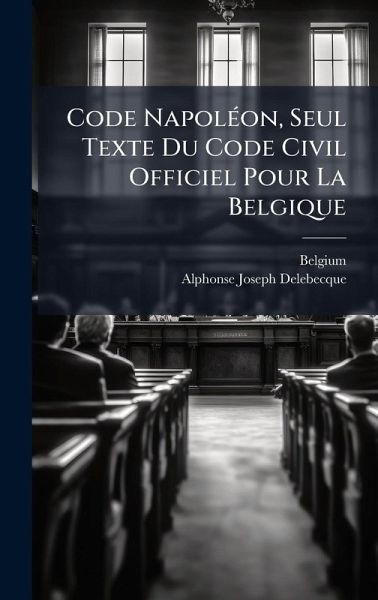
Code NapolÃ(c)on, Seul Texte Du Code Civil Officiel Pour La Belgique
Versandkostenfrei!
Versandfertig in über 4 Wochen
37,99 €
inkl. MwSt.

PAYBACK Punkte
19 °P sammeln!
This is a historical edition of the "Code Napoléon", the sole official text of the Civil Code for Belgium. This edition has been collated against the Bulletin des Lois, containing in italics those articles that have been repealed, and in notes the modifications introduced in Belgium from 1814 to January 1, 1857. A crucial resource for legal historians and scholars of comparative law, this volume provides insight into the evolution of Belgian civil law in the 19th century and its roots in the Napoleonic legal system. It offers a unique perspective on the adaptation and modification of French l...
This is a historical edition of the "Code Napoléon", the sole official text of the Civil Code for Belgium. This edition has been collated against the Bulletin des Lois, containing in italics those articles that have been repealed, and in notes the modifications introduced in Belgium from 1814 to January 1, 1857. A crucial resource for legal historians and scholars of comparative law, this volume provides insight into the evolution of Belgian civil law in the 19th century and its roots in the Napoleonic legal system. It offers a unique perspective on the adaptation and modification of French law within the Belgian context following the Napoleonic era. This work has been selected by scholars as being culturally important, and is part of the knowledge base of civilization as we know it. This work was reproduced from the original artifact, and remains as true to the original work as possible. Therefore, you will see the original copyright references, library stamps (as most of these works have been housed in our most important libraries around the world), and other notations in the work. This work is in the public domain in the United States of America, and possibly other nations. Within the United States, you may freely copy and distribute this work, as no entity (individual or corporate) has a copyright on the body of the work. As a reproduction of a historical artifact, this work may contain missing or blurred pages, poor pictures, errant marks, etc. Scholars believe, and we concur, that this work is important enough to be preserved, reproduced, and made generally available to the public. We appreciate your support of the preservation process, and thank you for being an important part of keeping this knowledge alive and relevant.


